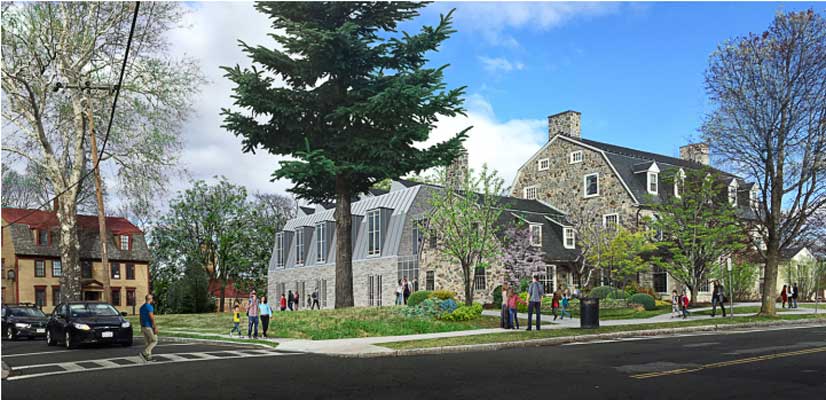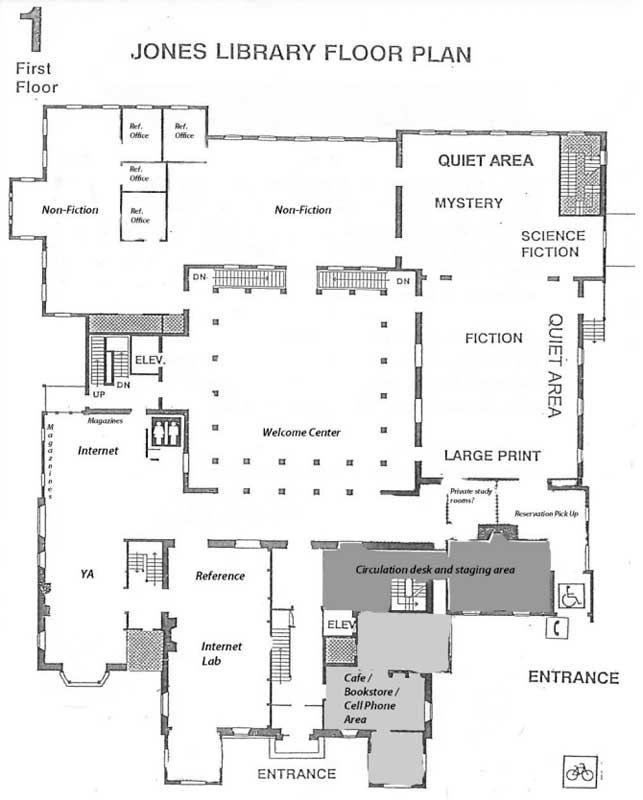Unpublished Jones Library Space Plan Proposes Alternatives To Costly Expansion

Photo: https://www.joneslibrary.org/
Jones Library News Highlights For The Week Of October 24, 2022
Massachusetts Library System Study Recommends More Efficient Use Of Existing Space
A professional space study requested by the Jones Library prior to development of the multimillion-dollar plan to expand the building by 15,000 sq. ft. reveals a number of recommendations for achieving programming goals within the existing library footprint.
The report, evidently heretofore unseen by the public, was prepared by Anna Popp, a consultant with Massachusetts Library System (MLS), a state-supported collaborative providing services to libraries across the Commonwealth. The document was obtained in response to a Public Record Request by The Amherst Indy after Trustee President Austin Sarat alluded to its existence at the September 12 Board meeting. An online search has turned up no mention of the study on the Jones Library or Town of Amherst websites, nor in any trustee meeting minutes.
[See related Letter: Why So Much Secrecy From The Jones Library Trustees?]
The Popp study recommends a combination of aggressive weeding of underutilized collections, low-cost space reassignments, repurposing some staff areas for public use, and researching options for storing Special Collections materials off-site.
The study is undated but is believed to have been done in early 2015 when the Jones Library Trustees Building Program reports that “an independent consultant conducted a lengthy survey to measure the effectiveness of the Jones Library and future needs from 2/12/2015 through 3/5/2015.”
Popp analyzed size and circulation data for the library’s various collections and applied the nationally recognized Wisconsin Public Library Standards to advise on which collections should be reduced. She identified the adult nonfiction (heavily used but also quite large), juvenile nonfiction, and magazine collections as being targets for aggressive weeding. Overall, she recommended reducing the number of books by 34,000 which would free up 600 to 1100 shelves and bring library holdings more in line with Wisconsin Standards.
[See related Public Libraries Are Shedding Books And Losing Visitors – So Why Do We Make Them Bigger?]
The report also pointed out that advances in technology allow replacing audiovisual formats like tapes and CDs with newer formats that require less space.
The study urged moving the library’s multiple separate storage spaces to a more efficient central location, “There are so many interesting areas in the Jones, and each department seems to have carved out its own storage spaces,” it states.
The analysis found that library areas currently assigned to staff might better serve as public spaces. Popp wrote, “I understand that staff value a clean, well-lit and attractive workspace. However, some of the ‘prime real estate’ in the Jones is currently limited to staff areas. This is space that is not available to the patrons, the people for whom the building was erected. I have attempted to make these areas available to users and find alternate attractive and functional areas for staff.”
Regarding the Jones Library’s extensive Special Collection materials, Popp acknowledged challenges, but advised thinking outside the box. “The space needs of the special collection pose a challenge to address. There is no available space adjoining the climate-controlled storage. Off-site storage options should be researched.”
Not only were space needs addressed, but operational improvements were suggested as well. Popp proposed moving the Director’s office to the third floor and repurposing the current office as a public refreshment area and lockable shop.
Recognizing the difficulty in marshalling funds and resources, Popp advocated a manageable roadmap or staged implementation schedule for space changes.
Finally, the space planning study presented a revised schematic design for the building’s four floors. Consultant Popp was able to accommodate a Large Meeting Room, a centralized Children’s Collection, a Crafts Room, a Lounge or Storytime space, a Young Adult meeting area, a dedicated ESL training space, an Internet Lab, a Career Center, Special Collections Exhibit and Reading Rooms near the Burnett Art Gallery, the most popular adult collections on the first floor, and a Café/Bookstore/Cellphone area. These goals would be achieved without knocking down any of the historic building’s exterior walls, and without the need for construction of a library expansion now estimated to cost about $50 million and running concurrently with an elementary school building project requiring a $65 million property tax override.


thank you Jeff.
This reminds me of a friend who runs a successful machine shop in greater Springfield.
They were so successful they decided they needed to build a larger building to house all the machines, and while they were at it, figure out the best space planning and flow in their new location.
When they had successfully done that, he realized that with the same strategizing and reorganizing, including dumping the stuff no longer useful, they had enough space in their original location.
In the case of our library, that might be so, but the fact that this secret plan has stayed purposely hidden is quite irritating.
Holy moly, the investigative journalism to find the truth in the, perhaps intentionally deceptive, workings of JLT and JL Director regarding the current demolition/expansion plan deserves a commendation for excellence.
Thank you Jeff and others for not settling for what, to many others, seemed unsettling, unreasonable, and unnecessary from the get go.
James Murphy
The suppression of this report by the Jones Library Trustees and Director is at best a dereliction of duty.
How are they to be held responsible?
Wow, imagine if this 2015 professional space study outlining ways the Jones Library could reorganize its existing space to meet all the library’s programming goals had been made public from the beginning! Instead, it took a public records request to unearth the fact that the Trustees actually had a viable option all along to renovate instead of going full tilt toward a wasteful demolition-expansion. This now $50 million dollar white elephant has been a secretive vanity project of an elite group who appear unconcerned that it may well jeopardize the town’s other major capital projects (a new school, fire station and DPW headquarters) as well as repairs to deteriorated streets and sidewalks that are so vital to the quality of life in Amherst. It’s time to ask who is benefitting from all this deception and why has this extravagant library demolition-expansion been foisted upon our town?
The Jones Trustees objected to a requirement in the first draft MOA with the town that they create a committee to develop a “plan B” to repair and renovate the library at a lesser cost, should their proposed project be cancelled due to escalating costs. Looks like we have a “plan B” right here.
Good question, Rob, about how to bring some public responsibility to the Jones Library Trustees and Director. The library zealots and friends of Amherst Forward who control Town Council and therefore Town Hall are not likely to help.
Thank you, Jeff Lee! Can we get this published in the Gazette, the Amherst Bulletin? In this age of wanton waste and over-consumption, which is slowly destroying our living planet, this plan by Anna Popp is worth wide spread attention.
Nina, We were just about to submit the same request. Not only is the too costly and destructive (on so many levels) current plan wasteful, but citizens of Amherst need to know the extent of deception to which some of their leaders will go to get their way, overall health of the town be damned.
When convinced of the righteousness and correctness of one’s cause, the temptation to selectively edit out those aspects of reality that do not support the ultimate goal must be overwhelming. I did a quick Google search for “Anna Popp Jones Library Amherst MA.” What appeared near the top of my search results was a pdf of the Jones Library Building Program, dated 2 July 2015. It is a 191-page document. I did a further search by Control F within that document, and the only appearance of Anna Popp’s name was in this paragraph: “The planning process began formally in the spring of 2012 when The Jones Library Director requested and received a visit from Ms. Rosemary Waltos, Library Building Consultant, Massachusetts Board of Library Commissioners and Ms. Anna Popp, Space Planning Advisor, Massachusetts Library System (MLS). After a walk-through of the building, their concerns were numerous” (p. 19). There is nothing wrong with stating that “their concerns were numerous.” However, failing to mention that solutions to such concerns were also offered is another matter entirely.